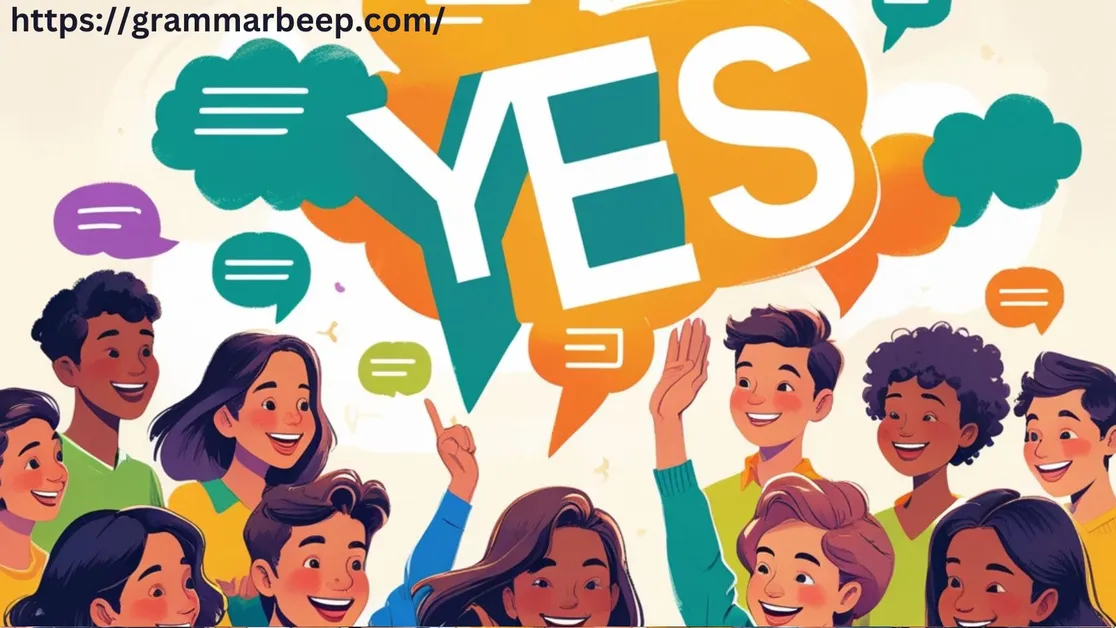Saying “yes” doesn’t always mean just using the word yes. The real magic lies in how you say it. From closing deals at work to confirming weekend plans, the right phrase can bring energy, warmth, or professionalism to your reply. In this guide, we’ll show you 27 powerful alternatives to “yes” that suit every setting.
Each phrase comes with a real-life example—emails, texts, chats—so you can expand your vocabulary and sharpen your tone naturally. Whether you’re looking for affirmative expressions or friendly affirmations, you’ll find ways that feel just right for how you communicate.
Absolutely
When you want to show unwavering enthusiasm, this is your go‑to.
Scenario – Email:
Hi Clara,
Would you be able to review the Q3 marketing plan by Friday?
Absolutely, Clara. I’ll have it on your desk by EOD Thursday.
Cheers,
Raj
This phrase packs an unreserved agreement and works well in both formal settings and casual ones—a powerful tool for affirmative expressions.
Certainly
Use this when you need a polite yet confident affirmation.
Scenario – Client Chat:
Client (Mark): Could we receive the revised draft tomorrow morning?
You: Certainly, Mark. I’ll send it to you at 9 AM tomorrow.
It signals clear agreement, commonly found among formal ways to say yes and shows you value their request.
Indeed
Perfect for reinforcing points or backing someone up confidently.
Scenario – Team Meeting Notes:
You: Sales are improving due to the new pricing model.
Colleague: We need to highlight that in the report.
You: Indeed, we’ll feature it front and center.
It’s great for expressions of agreement, especially when something is already understood.
Definitely
Use this when you want to make your enthusiastic agreement crystal clear.
Scenario – Text Message:
Friend (Jenny): Want to grab coffee tomorrow?
You: Definitely! Let’s meet at 10 AM.
It’s a classic casual way to say yes, signaling strong support and eagerness.
Of course
Ideal for comforting response and offering reassurance.
Scenario – Email:
Hi Tom,
Can you help me prepare the slide deck?
Of course, Tom. I’ll take care of it this afternoon.
It feels natural in both formal and casual settings and adds that human touch of reliability.
Check out this: 21 Other Ways to Say “Thank You for the Reminder”
Sure thing
Use this friendly phrase for casual ways to agree.
Scenario – Slack DM:
Coworker (Emily): Can you reorder our office snacks?
You: Sure thing, I’ll order them now.
Informal, relaxed, but still crystal clear—perfect for day-to-day office life.
Agreed
The ideal green light phrase for group consensus.
Scenario – Project Email:
Hi Team,
We should start A/B testing now and finalize creative by Monday.
Agreed. Let’s lock it in and get moving.
Regards,
Sam
It expresses professional affirmations and team-wide consent.
Understood
This is about confirming understanding and acknowledging instructions.
Scenario – Command from Manager:
Manager (Ravi): Please update the inventory numbers by 3 PM.
You: Understood, Ravi. I’ll get right on it.
Rather than a direct “yes,” it shows you get the task—and you’ll do it.
Affirmative
A crisp, technical discussions–style reply that’s direct and to the point.
Scenario – Support Chat:
System: Did the test environment deploy successfully?
You: Affirmative.
Often used in military, engineering, or IT-life, this short reply means yes—and verify that it’s done.
By all means
This one conveys enthusiastic support and encouragement.
Scenario – Mentorship Email:
Hi Julia,
Would you feel comfortable leading the onboarding webinar?
By all means, Julia. Your experience makes you the perfect fit.
It’s warm, positive – and gives someone a solid green light.
More for you: 20 Other Ways to Say “Happy to Hear That”
I’m in
A modern, friendly, and informal expression of commitment.
Scenario – Group Chat Planning Trip:
Alex: Planning on hiking this weekend. Anyone in?
You: I’m in! Sounds like a blast.
It tells your friends they can count on you—and you’re excited.
Absolutely yes
Add emphasis by doubling down on “yes.”
Scenario – Email Agreement:
Hi Chris,
Want to proceed with phase two?
Absolutely yes, Chris. Let’s do it.
This taps into both enthusiasm and formal affirmation—powerful combo.
You got it
Casual, confident, and personable—it’s like saying “Consider it done!”
Scenario – Internal Chat:
Boss (Sara): Please send me the monthly metrics.
You: You got it, Sara. I’ll email them by noon.
It’s helpful, human, and polite.
Sounds good
Use this in casual ways to say yes, often when you’re agreeing to a plan.
Scenario – Dinner Plan Text:
Friend (Lee): Let’s order Thai food tonight.
You: Sounds good! I’m hungry.
It shows you’re on board—and ready to go.
Count me in
Friendly and inclusive—it means you want to be part of it.
Scenario – Volunteering Request:
Organizer (Mia): Volunteers needed for the bake sale.
You: Count me in. I’d love to help out!
It’s a positive agreement phrase that builds community.
For your interest: 23 Other Ways to Say “Enjoy the Rest of Your Day”
That works
Short, clear, and professional—great in formal settings.
Scenario – Scheduling Email:
Hi Raj,
Can we meet Monday at 3 PM?
That works, thanks!
This reply gives a neat seal of approval without fuss.
Sure
Classic and versatile—a solid synonym for yes in most situations.
Scenario – Quick Chat:
Colleague (Dan): Can you pass the project files?
You: Sure, sending them now.
You’ll hear it everywhere—from zoom calls to kitchen chatter.
Yep / Yeah
Super casual and friendly—non-verbal yes expressions implied.
Scenario – Chatty Slack:
Teammate (Lily): Finished with the review?
You: Yep, all done.
Great in informal spaces, but avoid in serious or conservative contexts.
Totally
Energetic and youthful—enthusiastic agreement in a fun, upbeat way.
Scenario – Weekend Plans Text:
Friend (Nate): Want to hit the beach this weekend?
You: Totally, I can’t wait!
It evokes energy—perfect for social plans.
No problem
Friendly and helpful, used when a yes comes with a reassuring tone.
Scenario – Customer Reply:
Customer: Can I get an invoice copy?
You: No problem, I’m sending it now.
It shows you’re happy to help.
Let’s do it
An upbeat call to action—approving a suggestion with gusto.
Scenario – Brainstorm Chat:
Manager (Ayesha): Want to hold a pop‑up next month?
You: Let’s do it! I’ll start planning.
This phrase bursts with enthusiasm and confidence.
I would love to
Warm, polite, and personal—especially great when you show support.
Scenario – Invitation Reply:
Grace: Would you like to join our book club?
You: I would love to, Grace! Count me in every month.
It combines affection with a strong yes.
Sure — no worries
An easygoing twist on commitment with a comforting tone.
Scenario – Delivery Change Text:
Courier: Can I deliver tomorrow instead of today?
You: Sure — no worries. Tomorrow works fine.
Leans into reassurance and calm flexibility.
Yup
Short, informal, and efficient—best for quick confirmation.
Scenario – Family Group Chat:
Parent (Mom): Dinner at 7?
You: Yup, sounds great!
Often nonchalant, sometimes playful.
You might also like: 21 Other Ways to Say “According to”
Without a doubt
Leaves no room for hesitation—pure unreserved agreement.
Scenario – Performance Review Feedback:
You: Would you recommend Sarah for promotion?
Peer (Mark): Without a doubt, she’s exceeded expectations.
It adds weight to your endorsement.
Happy to
Friendly and enthusiastic—it shows you’re glad to say yes.
Scenario – Volunteer Email:
Hi Team,
Need someone to host the next training.
Happy to, sign me up.
It’s both professional and cheerful.
I’m all for it
This phrase announces personal alignment and supporting ideas fully.
Scenario – Proposal Meeting:
You: They suggested a monthly webinar series.
Teammate (Carlos):
That sounds useful to build brand authority.
You: I’m all for it. Let’s launch next quarter.
You’re not just agreeing—you’re actively endorsing.
Synonyms for “Yes” Mentioned in This Article
| Phrase | Tone/Context |
|---|---|
| Absolutely | Enthusiastic, formal or casual |
| Certainly | Polite, confident, formal |
| Indeed | Reinforcing, thoughtful |
| Definitely | Emphatic, strong agreement |
| Of course | Reassuring, expected |
| Sure thing | Friendly, casual |
| Agreed | Group consensus, professional |
| Understood | Confirming understanding |
| Affirmative | Technical, direct |
| By all means | Supportive, enthusiastic |
| I’m in | Casual commitment |
| Absolutely yes | Emphatic, strong yes |
| You got it | Friendly, helpful |
| Sounds good | Agreement to a plan |
| Count me in | Inclusive, friendly commitment |
| That works | Professional approval |
| Sure | Classic, versatile |
| Yep / Yeah | Casual, informal |
| Totally | Energetic, youthful agreement |
| No problem | Helpful, reassuring |
| Let’s do it | Action-oriented yes |
| I would love to | Warm, supportive |
| Sure — no worries | Easygoing, reassuring |
| Yup | Short, informal |
| Without a doubt | Convincing confirmation |
| Happy to | Cheerful willingness |
| I’m all for it | Active endorsement |
FAQs
Can these phrases be used in both writing and speech?
Yes, all these agreement phrases work well in emails, texts, or spoken conversations—just match the tone to the situation.
Are any of these expressions region-specific?
Some like “Sure thing” or “Totally” are more common in American English but are widely understood globally.
Do these alternatives work in customer service?
Absolutely—they help make replies more friendly and clear, improving customer experience.
Is it okay to mix formal and casual yes phrases?
Yes, just be mindful of the context. Mixing can work well when you want to sound both professional and approachable.
Will using varied affirmatives improve writing style?
Definitely—using a mix of affirmative expressions adds color, flow, and personality to your writing.
Conclusion
There’s more than one way to say yes, and now you’ve got 27 expressions of agreement that can suit every tone and situation. Use them to sound more natural, confident, or supportive.
From formal ways to say yes like “Certainly” to casual ways to say yes like “Sure thing,” each one helps you say what you mean, better. Let your affirmations reflect your intention—clearly and naturally.

Zoey Alba is an experienced blogger and language enthusiast with a passion for helping readers master the art of grammar. With years of expertise in writing, editing, and content creation, Zoey shares practical tips and insightful advice to make grammar accessible for all. When she’s not writing, Zoey enjoys reading, learning new languages, and inspiring others to write with confidence.
